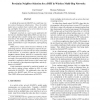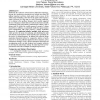307 search results - page 60 / 62 » The communication complexity of distributed task allocation |
133
Voted
AGENTS
2001
Springer
15 years 6 months ago
2001
Springer
Multi-Agent Systems are a promising way of dealing with large complex problems. However, it is not yet clear just how much complexity or pre-existing structure individual agents m...
168
Voted
P2P
2005
IEEE
15 years 7 months ago
2005
IEEE
A mobile ad hoc network (MANET) is a multi-hop wireless network having no infrastructure. Thus, the mobile nodes have to perform basic control tasks, such as routing, and higher-l...
134
click to vote
CAISE
2006
Springer
15 years 5 months ago
2006
Springer
Abstract. We discuss a case study for the hospital scenario where workflow model components are distributed across various computers or devices (e.g. mobile phones, PDAs, sensors, ...
114
Voted
JSA
2000
15 years 1 months ago
2000
Scheduling DAGs with communication times is the theoretical basis for achieving efficient parallelism on distributed memory systems. We generalize Graham's task-level in a ma...
126
Voted
ISLPED
2003
ACM
15 years 7 months ago
2003
ACM
Enabled by the continuous advancement in fabrication technology, present day synchronous microprocessors include more than 100 million transistors and have clock speeds well in ex...



